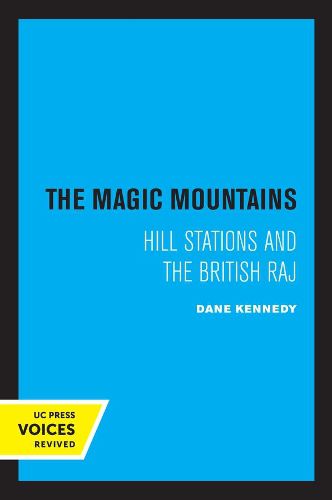Readings Newsletter
Become a Readings Member to make your shopping experience even easier.
Sign in or sign up for free!
You’re not far away from qualifying for FREE standard shipping within Australia
You’ve qualified for FREE standard shipping within Australia
The cart is loading…






Perched among peaks that loom over heat-shimmering plains, hill stations remain among the most curious monuments to the British colonial presence in India. In this engaging and meticulously researched study, Dane Kennedy explores the development and history of the hill stations of the raj. He shows that these cloud-enshrouded havens were sites of both refuge and surveillance for British expatriates: sanctuaries from the harsh climate as well as an alien culture; artificial environments where colonial rulers could nurture, educate, and reproduce themselves; commanding heights from which orders could be issued with an Olympian authority. Kennedy charts the symbolic and sociopolitical functions of the hill stations over the course of the nineteenth and early twentieth centuries, arguing that these highland communities became much more significant to the British colonial government than mere places for rest and play. Particularly after the revolt of 1857, they became headquarters for colonial political and military authorities. In addition, the hill stations provided employment to countless Indians who worked as porters, merchants, government clerks, domestics, and carpenters. The isolation of British authorities at the hill stations reflected the paradoxical character of the British raj itself, Kennedy argues. While attempting to control its subjects, it remained aloof from Indian society. Ironically, as more Indians were drawn to these mountain areas for work, and later for vacation, the carefully guarded boundaries between the British and their subjects eroded. Kennedy argues that after the turn of the century, the hill stations were increasingly incorporated into the landscape of Indian social and cultural life. This title is part of UC Press’s Voices Revived program, which commemorates University of California Press’s mission to seek out and cultivate the brightest minds and give them voice, reach, and impact. Drawing on a backlist dating to 1893, Voices Revived makes high-quality, peer-reviewed scholarship accessible once again using print-on-demand technology. This title was originally published in 1996.
$9.00 standard shipping within Australia
FREE standard shipping within Australia for orders over $100.00
Express & International shipping calculated at checkout
Perched among peaks that loom over heat-shimmering plains, hill stations remain among the most curious monuments to the British colonial presence in India. In this engaging and meticulously researched study, Dane Kennedy explores the development and history of the hill stations of the raj. He shows that these cloud-enshrouded havens were sites of both refuge and surveillance for British expatriates: sanctuaries from the harsh climate as well as an alien culture; artificial environments where colonial rulers could nurture, educate, and reproduce themselves; commanding heights from which orders could be issued with an Olympian authority. Kennedy charts the symbolic and sociopolitical functions of the hill stations over the course of the nineteenth and early twentieth centuries, arguing that these highland communities became much more significant to the British colonial government than mere places for rest and play. Particularly after the revolt of 1857, they became headquarters for colonial political and military authorities. In addition, the hill stations provided employment to countless Indians who worked as porters, merchants, government clerks, domestics, and carpenters. The isolation of British authorities at the hill stations reflected the paradoxical character of the British raj itself, Kennedy argues. While attempting to control its subjects, it remained aloof from Indian society. Ironically, as more Indians were drawn to these mountain areas for work, and later for vacation, the carefully guarded boundaries between the British and their subjects eroded. Kennedy argues that after the turn of the century, the hill stations were increasingly incorporated into the landscape of Indian social and cultural life. This title is part of UC Press’s Voices Revived program, which commemorates University of California Press’s mission to seek out and cultivate the brightest minds and give them voice, reach, and impact. Drawing on a backlist dating to 1893, Voices Revived makes high-quality, peer-reviewed scholarship accessible once again using print-on-demand technology. This title was originally published in 1996.